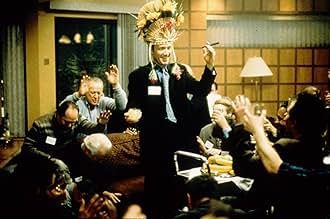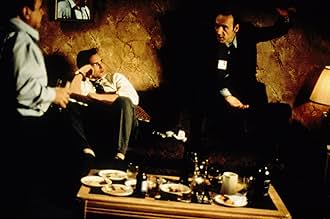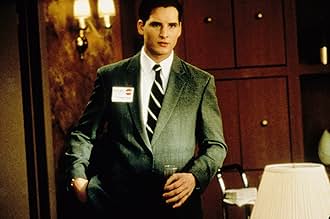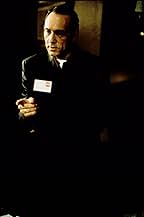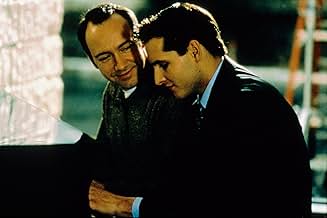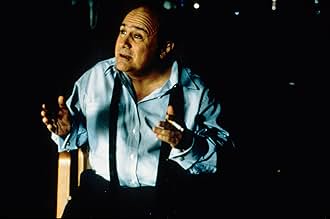Two veteran salesmen dissect a sales pitch to a particular client, through their young protégé.Two veteran salesmen dissect a sales pitch to a particular client, through their young protégé.Two veteran salesmen dissect a sales pitch to a particular client, through their young protégé.
- Awards
- 1 nomination total
Danny DeVito
- Phil Cooper
- (as Danny Devito)
Christopher Donahue
- Bartender
- (uncredited)
Ron Komora
- The Big Kahuna
- (uncredited)
Frank L. Messina
- Business Man
- (uncredited)
George F. Miller
- Hotel Patron Leaving Lobby
- (uncredited)
Jen Taylor
- Mrs. Jen Johnson
- (uncredited)
Featured reviews
Though essentially little more than a stage bound version of the play, `Hospitality Suite,' the film entitled `The Big Kahuna' earns distinction for its sharply delineated characters and the finely wrought performances of its three main actors. In fact, the stage origins of the film are evident in the fact that the action rarely extends beyond a single set a hotel suite in Wichita, Kansas in which three salesman are gathered for a convention and the fact that only four people are even assigned speaking parts (and even the fourth is a mere walk-on bellboy). All the other people we see serve as a kind of silent backdrop before which the three principal players enact their complex personal drama.
Kevin Spacey, in a truly brilliant performance, plays Larry, a middle-aged, sardonic salesman who sees life strictly from the perspective of a hardcore cynic and who, consequently, runs roughshod over his two business associates with his acerbic wit and hardnosed bluntness. In total contrast is Bob (Peter Facinelli), a 20-something neophyte to the selling business, a sincere, well-intentioned, but hopelessly naïve born-again Christian, who has trouble separating his career as a salesman from his felt need to fulfill the Biblical edict to go out among men and spread the Good News. Caught between the two is Phil (Danny DeVito), a 52-year old man who, after years of devoting his life to the cause of selling, has begun to seriously question the validity of his life's work and has, therefore, recently found himself contemplating such weighty matters as suicide, the existence of God and the meaning of love and friendship. Obviously, such cleanly delineated characters could well have slid over into two-dimensional stereotypes, yet the author, Roger Rueff, in adapting his play to the screen, has built into each of the three principal figures a dimension of multifaceted human complexity. Larry, for instance, despite all of his facile cynicism, shows a far deeper side to his character when, in a quiet moment in which Phil pours his heart out to him, he offers his buddy the hand of genuine compassion and friendship. We discover that the often-bitter tone Larry displays to the world is just a façade, a cover-up for the void that lies deep within his own troubled psyche. Similarly, Rueff avoids the common trap of reducing the devout Christian character to the customary level of a mindless buffoon. Although we sense that Bob too uses his Christianity as a way of ordering his life - thereby avoiding the messy ugliness that a more freethinking life often requires - yet, Rueff merely implies that Bob has some growing up to do, not that his belief system must itself be jettisoned. And Phil, caught between these two worldviews, provides, out of his own confused weakness, the voice of reasoned sanity that helps Larry and Bob come to a final understanding and mutual appreciation of each other. He sees Larry plainly for who he is, yet Phil knows that this is the person who means more to him than anyone else in the world. Similarly, though he somewhat admires and respects Bob's sincere devotion to his Christian principles, Phil knows that Bob has a long way to go before he becomes a true `man of character.'
`The Big Kahuna' does not provide big laughs, though the sardonic wit often strikes a deep chord in the audience. The film may also seem claustrophobic to those who demand more movement from their movies. The dialogue, however, is consistently sharp and incisive, even though Phil's final speech borders a bit on the pedantic. (At this point, Phil's function as the author's mouthpiece becomes a bit heavy-handed to say the least). Nevertheless, for those in search of a fine character study, driven by strong performances and insightful observations about human nature, `The Big Kahuna' is definitely worth checking out.
Kevin Spacey, in a truly brilliant performance, plays Larry, a middle-aged, sardonic salesman who sees life strictly from the perspective of a hardcore cynic and who, consequently, runs roughshod over his two business associates with his acerbic wit and hardnosed bluntness. In total contrast is Bob (Peter Facinelli), a 20-something neophyte to the selling business, a sincere, well-intentioned, but hopelessly naïve born-again Christian, who has trouble separating his career as a salesman from his felt need to fulfill the Biblical edict to go out among men and spread the Good News. Caught between the two is Phil (Danny DeVito), a 52-year old man who, after years of devoting his life to the cause of selling, has begun to seriously question the validity of his life's work and has, therefore, recently found himself contemplating such weighty matters as suicide, the existence of God and the meaning of love and friendship. Obviously, such cleanly delineated characters could well have slid over into two-dimensional stereotypes, yet the author, Roger Rueff, in adapting his play to the screen, has built into each of the three principal figures a dimension of multifaceted human complexity. Larry, for instance, despite all of his facile cynicism, shows a far deeper side to his character when, in a quiet moment in which Phil pours his heart out to him, he offers his buddy the hand of genuine compassion and friendship. We discover that the often-bitter tone Larry displays to the world is just a façade, a cover-up for the void that lies deep within his own troubled psyche. Similarly, Rueff avoids the common trap of reducing the devout Christian character to the customary level of a mindless buffoon. Although we sense that Bob too uses his Christianity as a way of ordering his life - thereby avoiding the messy ugliness that a more freethinking life often requires - yet, Rueff merely implies that Bob has some growing up to do, not that his belief system must itself be jettisoned. And Phil, caught between these two worldviews, provides, out of his own confused weakness, the voice of reasoned sanity that helps Larry and Bob come to a final understanding and mutual appreciation of each other. He sees Larry plainly for who he is, yet Phil knows that this is the person who means more to him than anyone else in the world. Similarly, though he somewhat admires and respects Bob's sincere devotion to his Christian principles, Phil knows that Bob has a long way to go before he becomes a true `man of character.'
`The Big Kahuna' does not provide big laughs, though the sardonic wit often strikes a deep chord in the audience. The film may also seem claustrophobic to those who demand more movement from their movies. The dialogue, however, is consistently sharp and incisive, even though Phil's final speech borders a bit on the pedantic. (At this point, Phil's function as the author's mouthpiece becomes a bit heavy-handed to say the least). Nevertheless, for those in search of a fine character study, driven by strong performances and insightful observations about human nature, `The Big Kahuna' is definitely worth checking out.
For some, this movie might seem quite boring. What's the point in watching three men talking in one room for almost two hours?! But tell you what?.. this movie is not boring at all! There's almost no storyline to speak of, but the script is more than beautiful. It will turn you into one big attentive ear. In addition, Kevin Spacey with his wonderful performance and entertaining sense of humor and wit made this movie a must-see. The movie doesn't want you to side with any of the three characters; it simply displays three different samples of human nature, and their views on the world (especially the concept of appearance vs reality).
Some movies are little more than photographed stage plays. 'The Big Kahuna' is like that. Most of the scenes are set in one hotel room and only 4 people have any lines. It could be said that all they do is talk, philosophize, and soul-search in this film. So if what they talk about is interesting and moves you, then the movie works. With subject matter such as religion, friendship, finding a meaning in life, and even the art of salesmanship, the characters definitely have a lot to say. And they're pretty funny, even if the film is too tragic to be called a comedy. Bottom line is, I'll long remember Danny DeVito's touching, understated performance.
He and Kevin Spacey (Phil and Larry, respectively) play experienced industrial lubricant salesman who've been sent to a convention in Wichita. Accompanying the two longtime friends and colleagues is a young co-worker, Bob (Peter Facinelli). They're hosting a small party in their hospitality suite for the elusive Dick Fuller. This is a client who could conceivably make or break their careers, but might not even show up to talk biz. Fuller represents the title character, although you could also say the kahuna is God. The final third of the picture delves deeply into spiritual belief and the search for the man above. Facinelli is devout, Spacey is not, DeVito rides in the middle lane and tries to keep the peace.
Whether or not they actually make the big deal plays second fiddle to the give-and-take relationship of the 3 very different men. Spacey is as witty and smart as usual, but DeVito is the soul of 'The Big Kahuna'. He's been good before, but he's generally a comic actor. Here, he's the straight man. The writer and director (Roger Rueff and John Swanbeck, who've never made another film) know how to give Spacey his big scenes and they REALLY know how to let DeVito play everything in expressions and tone. The filmmakers aren't breaking new turf, but they let their excellent actors act. Even if this is just another verse in the 'Death Of A Salesman' song, DeVito's got the goods on Willy Loman.
He and Kevin Spacey (Phil and Larry, respectively) play experienced industrial lubricant salesman who've been sent to a convention in Wichita. Accompanying the two longtime friends and colleagues is a young co-worker, Bob (Peter Facinelli). They're hosting a small party in their hospitality suite for the elusive Dick Fuller. This is a client who could conceivably make or break their careers, but might not even show up to talk biz. Fuller represents the title character, although you could also say the kahuna is God. The final third of the picture delves deeply into spiritual belief and the search for the man above. Facinelli is devout, Spacey is not, DeVito rides in the middle lane and tries to keep the peace.
Whether or not they actually make the big deal plays second fiddle to the give-and-take relationship of the 3 very different men. Spacey is as witty and smart as usual, but DeVito is the soul of 'The Big Kahuna'. He's been good before, but he's generally a comic actor. Here, he's the straight man. The writer and director (Roger Rueff and John Swanbeck, who've never made another film) know how to give Spacey his big scenes and they REALLY know how to let DeVito play everything in expressions and tone. The filmmakers aren't breaking new turf, but they let their excellent actors act. Even if this is just another verse in the 'Death Of A Salesman' song, DeVito's got the goods on Willy Loman.
10ToldYaSo
"The Big Kahuna" proved to be one of the finest offerings that I was privy to at the Toronto International Film Festival this year. The expression "saving the best for last" applies strongly to this film. We were fortunate to have a Q&A after the film with Roger Rueff, the screenwriter of this eloquently written piece, John Swanbeck, the director enjoying all that a first timer could hope for from his debut, and the gifted actor Kevin Spacey, who starred in and produced the film.
This marvellous examination of three men of different age groups at a convention in Wichita also features the talents of Danny DeVito who apparently came to the production in the proverbial last minute. This film was shot in a very short sixteen days which comes as a surprise, despite it's one central location, as the dialogue is so strong. The best way to describe it is as almost poetic.
The script was adapted from the play "Hospitality Suite", also written by Rueff, who revealed in the Q&A that the story was based upon his own experiences at a sales convention long ago. But he assured us that his character of the young, impressionable, bible thumping "Bob" was not based on himself. Rueff also noted that with this being his first screenplay, he had worried about the horror stories he heard where scripts are butchered and transformed into things the writer never intended in many Hollywood productions. But in this case, he trusted the director and cast implicitly and was not disappointed in any way.
Kevin Spacey shines in this sneak peak behind the scenes of a sales convention where the future of a company lies squarely on the shoulders of three men in the pursuit of a big client. The president of another company represents the biggest potential account they will ever have. They exchange stories, accounts and personal philosophies and find how different they are from one another based on what they've been through.
The interaction between the three actors is mesmerizing. They take the audience into what feels like a true life account documented verbatim. To say more would spoil the outcome for those who've not yet had a chance to enjoy this film. It is my strong recommendation that all of those who have not, do so at their first available opportunity.
This marvellous examination of three men of different age groups at a convention in Wichita also features the talents of Danny DeVito who apparently came to the production in the proverbial last minute. This film was shot in a very short sixteen days which comes as a surprise, despite it's one central location, as the dialogue is so strong. The best way to describe it is as almost poetic.
The script was adapted from the play "Hospitality Suite", also written by Rueff, who revealed in the Q&A that the story was based upon his own experiences at a sales convention long ago. But he assured us that his character of the young, impressionable, bible thumping "Bob" was not based on himself. Rueff also noted that with this being his first screenplay, he had worried about the horror stories he heard where scripts are butchered and transformed into things the writer never intended in many Hollywood productions. But in this case, he trusted the director and cast implicitly and was not disappointed in any way.
Kevin Spacey shines in this sneak peak behind the scenes of a sales convention where the future of a company lies squarely on the shoulders of three men in the pursuit of a big client. The president of another company represents the biggest potential account they will ever have. They exchange stories, accounts and personal philosophies and find how different they are from one another based on what they've been through.
The interaction between the three actors is mesmerizing. They take the audience into what feels like a true life account documented verbatim. To say more would spoil the outcome for those who've not yet had a chance to enjoy this film. It is my strong recommendation that all of those who have not, do so at their first available opportunity.
The Big Kahuna
This three-character movie, based on the play by Roger Rueff, deals with salesmen who are somewhat impatiently waiting for a very important business client - a.k.a. The Big Kahuna - on whom the fortunes of their company rests. Should they land the contract with this mysterious bigwig, their company will prosper. If they don't land the contract, of course, then they're all sunk.
Larry (Kevin Spacey) and Phil (Danny DeVito) are the salesmen, and Bob (Peter Facinelli) is the marketing guy. Bob's a rookie, and Larry and Phil try to prep him for handling himself with potential customers. They've rented the hospitality suite in the hotel to entertain their clients and are planning on having a small party, hoping that the Big Kahuna will show up. No, it's not Waiting for Godot, but it's along those lines.
This is basically a character study. There's a lot of dialog - virtually the entire movie takes place in the suite, with only a few very minor scenes outside it - and each word is absolutely dripping with meaning. There aren't any throwaway lines in this movie, folks. Most movies contain generic lines that would fit in any similar movie. Not this one. If you're a fan of well-written movies, this is a prime example of how one should be constructed.
But with such an emphasis on the dialog, there's naturally little action. This is always a problem with movies based on plays. They come off restrained, stagey, and claustrophobic. But the lack of action actually gives the viewer the opportunity to watch two decidedly different acting styles. Spacey is bombastic, punctuating each syllable with a sneer or a rant. DeVito, on the other hand, is more reserved and appears wizened as a result. Each actor turns in a stunning performance, with Spacey basically reprising the role he played in Glengarry Glen Ross. The only one who seems out of place is Facinelli, who is ineffective as Bob the marketing guy.
The Big Kahuna is compelling, as long as you don't mind talky comedy-dramas.
This three-character movie, based on the play by Roger Rueff, deals with salesmen who are somewhat impatiently waiting for a very important business client - a.k.a. The Big Kahuna - on whom the fortunes of their company rests. Should they land the contract with this mysterious bigwig, their company will prosper. If they don't land the contract, of course, then they're all sunk.
Larry (Kevin Spacey) and Phil (Danny DeVito) are the salesmen, and Bob (Peter Facinelli) is the marketing guy. Bob's a rookie, and Larry and Phil try to prep him for handling himself with potential customers. They've rented the hospitality suite in the hotel to entertain their clients and are planning on having a small party, hoping that the Big Kahuna will show up. No, it's not Waiting for Godot, but it's along those lines.
This is basically a character study. There's a lot of dialog - virtually the entire movie takes place in the suite, with only a few very minor scenes outside it - and each word is absolutely dripping with meaning. There aren't any throwaway lines in this movie, folks. Most movies contain generic lines that would fit in any similar movie. Not this one. If you're a fan of well-written movies, this is a prime example of how one should be constructed.
But with such an emphasis on the dialog, there's naturally little action. This is always a problem with movies based on plays. They come off restrained, stagey, and claustrophobic. But the lack of action actually gives the viewer the opportunity to watch two decidedly different acting styles. Spacey is bombastic, punctuating each syllable with a sneer or a rant. DeVito, on the other hand, is more reserved and appears wizened as a result. Each actor turns in a stunning performance, with Spacey basically reprising the role he played in Glengarry Glen Ross. The only one who seems out of place is Facinelli, who is ineffective as Bob the marketing guy.
The Big Kahuna is compelling, as long as you don't mind talky comedy-dramas.
Did you know
- TriviaKevin Spacey's character, Larry Mann is a salesman that talks about manipulating clients throughout the movie. At about the 34 minute mark he wears the hat featured in the movie's poster and is apparently pitching to a group of clients. The pitch is inaudible since there's music playing, a trumpet-orchestra version of Henry Mancini's theme for Charade (1963) which starred Cary Grant and Audrey Hepburn, a movie that revolved around lies, deception and deceit.
- GoofsWhen Larry attacks Bob he pushes him on a table with food and juice glasses. But when Bob gets up a moment later there are no stains on the back of his white shirt.
- Quotes
Larry Mann: There are people in this world, Bob, who look very official while they are doing what they are doing. And do you know why?
Bob Walker: Why?
Larry Mann: Because they don't know what they are doing. Because if you know what you are doing, then you don't have to look like you know what you are doing, because it comes naturally.
- SoundtracksHey Pachuco!
Written by Eddie Nichols, James Achor & Mando Dorame
Performed by Royal Crown Revue
Published by Zip Gun Music, J. Achor Music & Dorame Music
Courtesy of Warner Bros. Records Inc.
By arrangement with Warner Special Products
- How long is The Big Kahuna?Powered by Alexa
Details
Box office
- Budget
- $7,000,000 (estimated)
- Gross US & Canada
- $3,165,544
- Opening weekend US & Canada
- $80,957
- Apr 30, 2000
- Gross worldwide
- $3,728,888
- Runtime
- 1h 30m(90 min)
- Color
- Sound mix
- Aspect ratio
- 1.85 : 1
Contribute to this page
Suggest an edit or add missing content


